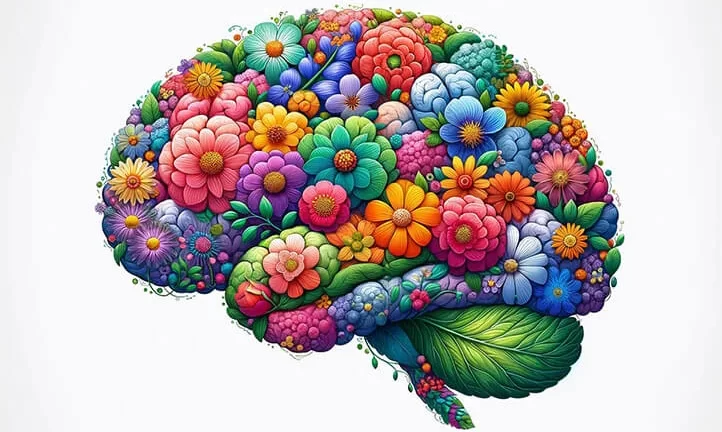Mental health is a state of psychological well-being where a person can realize their potential, cope with everyday life stresses, work productively, and contribute to society. In a broader sense, mental health is not merely the absence of mental disorders and illnesses but also the presence of positive qualities such as emotional resilience, interpersonal interaction, self-awareness, and the ability to empathize.
Mental health is important at all stages of life, from childhood and adolescence to adulthood and old age, covering a wide range of issues related to emotional, psychological, and social well-being. This state affects how we think, feel, and behave in everyday life, as well as helps determine how we handle stress, interact with others, and make decisions.
Mental health is critical to an individual’s overall well-being. It influences a person’s ability to realize their potential, cope with stress, and work productively. Furthermore, it plays a key role in developing healthy interpersonal relationships, participating in social life, and interacting with the surrounding world. Mental health is also closely linked to physical health; mental issues can exacerbate physical illnesses, just as physical problems can negatively affect mental well-being. Improving mental health significantly enhances the quality of life, contributing to better overall well-being.
The concept of mental health began to form in the late 19th and early 20th centuries. Its foundations were laid within the mental hygiene movement, which was initiated in 1908 by psychiatric service users and professionals interested in improving the conditions and quality of treatment for people with mental disorders. The concept was first developed by Isaac Ray, one of the founders of the American Psychiatric Association. In 1893, he introduced the term “mental hygiene” as “the art of preserving the mind from all incidents and influences capable of deteriorating its qualities, weakening its energy, or disrupting its functioning.”
The beginning of the 20th century marked further development of this idea when Clifford Beers founded Mental Health America – the National Committee for Mental Hygiene after publishing his memoir as a patient in several psychiatric institutions, A Mind That Found Itself, in 1908, and opened the first outpatient mental health clinic in the United States.
Thus, the concept of mental health was shaped by the efforts of many individuals and organizations striving to improve the understanding and treatment of mental disorders, as well as promote ideas of mental well-being and prevention.

The Connection Between Mental Health and Emotional Resilience
Emotional resilience is the ability of a person to adequately respond to stressful situations, maintain calmness and confidence in uncertainty or emotional tension. It also includes the ability to return to a normal emotional state after difficult experiences, flexibility in decision-making, and interaction with the world around them.
The connection between mental health and emotional resilience is key to understanding a person’s overall well-being. Mental health, as a state of psychological well-being, affects how a person perceives, experiences, and manages their emotions, as well as their ability to adapt to various life situations.
People with good mental health are usually more emotionally resilient. They can effectively manage their feelings, maintain a positive outlook on life, and constructively cope with various challenges and stress. On the contrary, when mental health is at risk, it leads to reduced emotional resilience, making a person more vulnerable to stress and psychological difficulties.
It can be confidently stated that mental health and emotional resilience are interconnected, and maintaining each of these aspects is crucial for overall psychological well-being and a person’s ability to successfully handle life’s challenges.
Practices to Strengthen Emotional Resilience
To strengthen emotional resilience, various practices can be used to help improve emotional management and mental health. Here are several effective methods:
- Meditation and mindfulness. Regular meditation practice helps calm the mind, improve concentration, and reduce stress levels. Mindfulness teaches us to feel the present moment, which helps achieve calmness and clarity of thought.
- Keeping a journal. Writing down your thoughts and feelings can help understand and manage emotions, become aware of, and rethink problems and conflicts.
- Physical activity. Regular exercise not only supports physical health but also promotes the production of endorphins, which improve mood and reduce stress.
- Developing communication skills. The ability to communicate effectively helps improve interpersonal relationships and reduces the likelihood of conflicts and misunderstandings.
- Gratitude practice. Daily expressions of gratitude for something positive in life improve mood and the perception of the world.
- Relaxation techniques and breathing exercises. Regular relaxation and mindful breathing help reduce stress levels and improve emotional state.
- Setting realistic goals. Working towards achievable goals and celebrating small successes boost self-confidence and a sense of control over one’s life.
- Developing empathy and social support. Understanding and empathy towards others, as well as having a supportive social circle, contribute to emotional resilience.
- Managing negative emotions. Recognizing, accepting, and constructively processing negative emotions, such as anger, sadness, or fear.
- Professional help when needed. Consulting a psychologist can be an important step in improving emotional well-being and developing resilience.
These practices will not only improve emotional resilience but also enhance the overall quality of life.

Mental Health and Longevity
Mental health and longevity are closely interconnected, forming two important aspects of a person’s overall well-being. In recent decades, scientists and researchers have increasingly focused on how mental health affects both the length and quality of life. With each passing year, more evidence accumulates showing that caring for mental well-being can play a key role in ensuring not only a longer but also a happier and more fulfilling life.
Maintaining mental health in middle and old age not only helps prevent the development of many mental disorders but also contributes to the maintenance of physical health. The ability to cope with stress, maintain an active social lifestyle, and keep a positive outlook on life are all important components that contribute not only to improved quality of life but also to its duration.
In this context, it is interesting to consider which factors of mental health have the greatest impact on longevity and how this knowledge can be applied.
The Impact of Mental Health on Physical Condition
Mental health has a significant impact on a person’s physical condition, as evidenced by numerous studies. This mind-body interaction manifests in the following ways:
- Stress and the immune system. Chronic stress, which is often a result of mental health issues, can weaken the immune system. This makes the body more vulnerable to various diseases, including infectious illnesses.
- Cardiovascular diseases. There is a link between mental disorders such as depression and anxiety and an increased risk of cardiovascular diseases. Stress and poor emotional regulation can raise blood pressure and cholesterol levels.
- Sleep and recovery. Mental health affects the quality and duration of sleep, which is a key factor in overall physical health and the body’s recovery.
- Behavioral factors. People suffering from mental disorders are more likely to develop harmful habits such as smoking, alcohol abuse, or unhealthy eating, which negatively impacts physical health.
- Chronic diseases. Mental health can influence the onset and progression of chronic diseases such as diabetes and arthritis, exacerbating symptoms and complicating treatment.
- Pain perception. Mental state can affect the perception of pain. People with mental disorders often experience more intense pain sensations.
Maintaining mental health not only improves the quality of life from a psychological perspective but also plays a crucial role in supporting physical health. This underscores the need for a comprehensive approach to health care, encompassing both physical and mental well-being.
The Role of Mental Health in Prolonging Life
Mental health plays a significant role in prolonging life by influencing several key mechanisms:
- Reducing stress. Good mental health helps effectively manage stress, which, if uncontrolled, can lead to a host of physical problems, including cardiovascular diseases.
- Improving immune function. A positive mental state is associated with a stronger immune system, which helps prevent illnesses and promotes faster recovery.
- Healthy habits. People with good mental health tend to engage in regular physical activity and lead healthier lifestyles, avoiding harmful habits such as smoking and excessive alcohol consumption.
- Quality and duration of sleep. Mental health directly affects sleep quality, which is an important factor in maintaining overall physical health and prolonging life.
- Better management of chronic diseases. Mental well-being helps individuals more effectively manage chronic diseases, increasing life expectancy and improving quality of life.
- Social connections and support. Good mental health fosters strong social connections, which, in turn, positively impact longevity.
- Positive life outlook. Optimism and a positive perception of life, which are aspects of mental health, contribute to longevity by reducing stress and improving overall well-being.
Research and Statistics on the Connection Between Mental Health and Longevity
Research by the American National Institute on Aging (NIA) has shown that people with mental disorders in their youth are more likely to show signs of accelerated aging in middle age. They have a higher likelihood of developing other diseases and an increased risk of premature death.
In a study published in JAMA Network Open, the health status of more than 2 million New Zealanders aged 10 to 60 was analyzed over 30 years. The results showed that people who were hospitalized for mental health problems, including substance use disorders, psychotic, mood, and behavioral disorders, were more likely to face diseases such as cancer, diabetes, cardiovascular diseases, and died earlier than those without mental health problems.
New Zealand researchers also found that middle-aged people with a history of mental health problems aged faster, measured by a panel of biomarkers and assessments of sensory, motor, and cognitive functions. This connection between mental health and longevity remained significant even after controlling for other factors that could accelerate aging, such as smoking, being overweight, low socioeconomic status, preexisting diseases, a history of poor childhood health, or abuse.
These studies highlight the importance of improving mental health in youth as a means of enhancing overall health and extending life.

Ways to Improve Mental Health
In today’s world, where the fast pace of life and numerous challenges constantly exert pressure on individuals, the issue of mental health has become especially relevant. Taking care of mental well-being is now an integral part of maintaining overall health and quality of life. It is important to realize that mental health is not a static state but a dynamic process that requires attention and care.
Modern research and practical approaches are unveiling more and more ways to improve mental health. From everyday habits and lifestyle changes to professional help and therapeutic methods, there are many paths that can help everyone on their journey toward mental well-being. These methods and approaches can vary depending on individual needs and circumstances, but the key is that they provide tools for strengthening mental health and improving overall well-being.
Understanding that mental health is more than just the absence of mental illness allows us to approach this topic more deeply and thoughtfully. Mental well-being encompasses emotional states, psychological resilience, social interactions, and much more, all of which collectively shape our ability to live a fulfilling and happy life.
Daily Habits and Rituals
Daily habits and rituals have a significant impact on mental health. Regular actions not only help create structure and order in everyday life but also contribute to fostering a positive mindset, improving concentration, and reducing stress levels. Here are some examples of such useful habits and rituals:
- Morning meditation or prayer helps to focus and set a positive tone for the day.
- Gratitude journaling. Writing down things you are grateful for daily fosters a positive mindset and appreciation.
- Regular physical exercise improves not only physical health but also mental well-being, promoting the release of endorphins – the “happiness hormones.”
- Morning planning helps organize the day by setting clear goals and priorities, reducing stress and improving time management.
- Healthy eating plays a major role in mental health, as certain foods positively affect mood and energy levels.
- Journaling. Regular diary entries help express and process emotions, contributing to self-reflection.
- Reading before bed is a great way to relax before sleep, reducing stress and improving sleep quality.
- Digital detox. Taking a break from electronic devices helps improve focus and reduce information overload.
- Breathing exercises. Regular practice of breathing exercises helps lower stress levels and improve concentration.
- Self-education. Learning new skills or reading educational materials supports mental development and cognitive functions.
These daily habits and rituals can be adapted to individual preferences and lifestyles, creating a foundation for improving mental health and overall well-being.
Psychotherapy and Counseling
Psychotherapy and counseling are key elements in improving and maintaining mental health. These forms of professional help provide individuals with a space to understand and work on their psychological issues, emotional difficulties, and behavioral concerns. Here are the main aspects of psychotherapy and counseling:
- Psychotherapy is a process in which qualified therapists help clients explore and address mental issues. Psychotherapy can be conducted individually, with couples, families, or in groups, and may include various approaches such as cognitive-behavioral therapy, psychoanalysis, gestalt therapy, systemic family therapy, and many others.
- Psychological counseling is usually more short-term and focuses on specific issues, such as work-related stress, divorce, or parenting concerns. Counselors provide support by helping clients develop coping strategies and make decisions.
- Treatment of mental disorders. Psychotherapy is often used in combination with medication to treat mental disorders such as depression, anxiety disorders, and bipolar disorder.
- Skill development. One of the key aspects of psychotherapy and counseling is helping clients develop effective ways to cope with stress, emotional challenges, and everyday problems.
- Self-knowledge and personal growth. Psychotherapy provides an opportunity for deep self-reflection and self-awareness, contributing to personal growth and an improved quality of life.
- Support in crisis situations, such as the loss of a loved one, traumatic events, or major life changes. Here, psychotherapy and counseling can offer invaluable support.
- Long-term improvement in quality of life. Although psychotherapy can be a challenging and long process, it provides clients with the opportunity to significantly improve their lives in the long term.
It is worth noting that psychotherapy and counseling require professional qualifications, and it is important to choose a specialist who meets your individual needs and circumstances.
The Role of Nutrition and Physical Activity
Healthy eating and regular physical activity are the cornerstones of both a strong body and a balanced mind. Let’s take a closer look at how diet and exercise affect mental well-being.
A key factor linking physical fitness and emotional balance is the production of hormones. During active workouts, the body releases endorphins – “happiness hormones” that improve mood and relieve stress. Equally important is the production of serotonin and dopamine – mediators of positive emotions and motivation. The optimal balance of these hormones depends on both fitness and a balanced diet.
Another important aspect is maintaining healthy gut flora. It directly affects the brain’s limbic system, responsible for emotions and behavior. A healthy gut flora stabilizes this system, while an unhealthy one destabilizes it, increasing the risk of anxiety and even depression. The growth of beneficial bacteria critically depends on a balanced diet rich in fiber and healthy fats.
Also essential are water-salt balance and the homeostasis of minerals in the body, primarily magnesium, zinc, and iron. Deficiency of these elements often leads to mood decline and emotional disorders. This deficit can arise from poor nutrition or increased physical activity.
It is clear that diet and exercise should be balanced and complement each other. An excess or lack of nutrients against the background of intense exercise will lead to a disruption of the body’s internal balance. As a result, there can be a deterioration in emotional well-being, reduced stress resistance, impaired brain function, and a tendency toward anxiety and depressive states.
Fortunately, maintaining harmony between physical activity and diet is not difficult. It is enough to follow simple principles. First, make diverse and balanced nutrition with sufficient protein, healthy fats, and carbohydrates a habit. Second, ensure proper recovery after workouts, including quality rest and replenishing lost resources and micronutrients.
In addition to the benefits described above, proper nutrition and physical activity positively affect self-esteem and confidence. Improving appearance boosts confidence and overall well-being. It is also important to remember the social aspects: group sports and shared meals help strengthen social ties and improve psychological well-being.
By paying attention to both your diet and regular moderate physical activity, your mental health will surely reward you with excellent well-being, a positive outlook on life, and resilience to stress!

Mental Health: Myths and Reality
Mental health is a topic surrounded by many myths and misconceptions. Let’s explore some of the most common stereotypes and see how much truth they hold.
“Mental disorders are caused by a weak character.” This is one of the most harmful and mistaken beliefs. The causes of mental health problems lie in the complex interaction of social, psychological, and biological factors. These are serious medical conditions, not a sign of “weak will.”
Another myth is that “people with mental illnesses can’t live a full life.” This is far from true! Modern methods of therapy and psychological support are highly effective. They help millions of people worldwide manage their mental health and succeed in their careers, relationships, and creative endeavors.
There’s also the other extreme: “mental illnesses are treated only with medication.” Many issues can be resolved through psychotherapy or sessions with a psychologist, without any medication. Medications are mainly needed for severe neuropsychiatric conditions.
Many believe that mental health problems only affect “lunatics” in psychiatric hospitals. In reality, the spectrum of disorders is very broad—ranging from mild forms of depression to schizophrenia. Up to 30% of the population regularly faces anxiety and depressive conditions.
Another myth is that “only weak people go to psychologists.” This stereotype prevents many from seeking professional help. In fact, the ability to ask for help is a sign of inner strength and maturity. Today, visiting a psychologist is as natural as going to a family doctor.
The influence of such stereotypes not only oppresses people suffering from mental disorders but also puts pressure on society as a whole, maintaining a culture of silence and stigmatization around mental health. Breaking these myths is a crucial step toward creating a more just and caring society, where every individual feels supported and understood.
The Importance of Education and Public Awareness
Education and public awareness play a key role in dismantling stereotypes and misunderstandings related to mental health. Raising awareness helps reduce the stigma that often surrounds people experiencing mental health issues, and promotes a more open and empathetic societal approach to these topics.
Proper education on mental health provides a deeper understanding of the causes and nature of mental disorders, debunking common myths and misconceptions. This knowledge helps people recognize the symptoms of mental illnesses both in their own lives and in the lives of those around them, facilitating early intervention and treatment.
Moreover, public awareness fosters support for policies and programs aimed at mental health in workplaces, educational institutions, and community services. Creating educational campaigns and awareness programs leads to a deeper and more comprehensive approach to mental health issues at the societal level.
Examples of Successful Mental Health Awareness Campaigns
There are many successful campaigns aimed at raising awareness of mental health. Here are a few examples:
- How Are You? (Ukraine). This campaign was initiated as part of the nationwide Mental Health Program. Its goal is to create a culture of mental health care in society, provide information, and offer tools that help Ukrainians take care of their emotional well-being.
- Bell Let’s Talk (Canada). This annual campaign focuses on breaking the stigma associated with mental illnesses. It includes large-scale educational outreach and funding for various mental health-related initiatives.
- Mind (UK). This campaign is aimed at changing attitudes toward mental health and reducing stigma. It involves various events and promotional activities focused on raising awareness and education.
- Mental Health America. This organization runs a number of campaigns aimed at improving mental health at the societal level. They provide educational resources, mental health screenings, and awareness programs.
- R U OK? (Australia). This campaign encourages people to ask others, “Are you okay?” as a way to start a dialogue about mental health and support.
- World Mental Health Day. Organized annually by the World Federation for Mental Health, this event aims to raise global awareness about mental disorders.
These campaigns demonstrate the importance and effectiveness of educational initiatives in the field of mental health. They help dispel stereotypes, improve access to resources and support, and contribute to the creation of a healthier society.
Stories of People Who Improved Their Mental Health
The stories of people who have managed to improve their mental health are inspiring and motivating. Here are a few examples that show the diversity of approaches and strategies people use to overcome their mental challenges:
- Overcoming depression through therapy and meditation. A woman shared her journey of battling depression. She started attending cognitive-behavioral therapy and practicing meditation. Over time, these practices helped her manage negative thoughts and improve her emotional well-being.
- Lifestyle and habit changes. A man shared his story of how regular physical exercise, a balanced diet, and a sleep schedule helped him cope with anxiety and stress. Physical activity and healthy eating became his way to boost mood and overall well-being.
- Support from the community. A woman recounted her experience overcoming post-traumatic stress disorder through participation in support groups. Connecting with others who had faced similar challenges helped her feel less isolated and find paths to recovery.
- Art and creativity as therapy. Some people find solace and express their emotions through art, music, or writing. One person shared how art therapy helped them cope with depression and opened a new way for self-expression and self-discovery.
These stories highlight that there is no single correct path to improving mental health. Each individual may find their own approach that works for them, whether it’s therapy, lifestyle changes, community support, or creative self-expression. The key is the willingness and readiness to seek solutions and support to improve one’s mental health.

Conclusion
Mental health is an integral and critically important part of each person’s overall well-being and health. It affects our behavior, thinking, emotions, and ability to cope with everyday challenges. Improving mental health enhances the quality of life, promotes physical health, increases productivity, strengthens interpersonal relationships, and contributes to social development.
Caring for mental health is not just about combating mental disorders, but also about striving to improve emotional well-being, self-understanding, and personal potential. The role of education and raising awareness about mental health is undeniably important for debunking myths and providing access to necessary help and support.
The stories of people who have improved their mental health are evidence that change is possible and can lead to significant improvements in quality of life. They also remind us of the variety of approaches and methods that can be used to strengthen mental well-being, including professional psychotherapy, personal growth, lifestyle changes, and participation in support groups.
Overall, mental health is a fundamental aspect of achieving a full, healthy, and happy life, and its importance should be recognized and considered at all levels of society, from personal interactions to public policy and healthcare.




